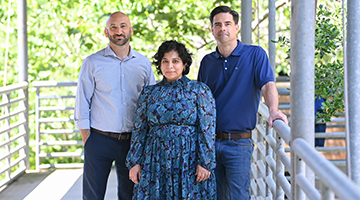After receiving second patent, UNF researchers closer to producing drug that can “turn off” cancer
 Three University of North Florida researchers recently received a second US patent for their cancer-fighting peptoid compound that can essentially “turn off” cancer. This new patent protects the compound based on its unique chemical structure, which mimics natural proteins in the body, but offers greater stability and a longer lifespan than traditional proteins. The first patent, which they received last year, covered the functional ability of the compound to kill cancer cells.
Three University of North Florida researchers recently received a second US patent for their cancer-fighting peptoid compound that can essentially “turn off” cancer. This new patent protects the compound based on its unique chemical structure, which mimics natural proteins in the body, but offers greater stability and a longer lifespan than traditional proteins. The first patent, which they received last year, covered the functional ability of the compound to kill cancer cells.
The UNF faculty team of Drs. Bryan Knuckley and Corey Causey from chemistry and biochemistry and Dr. Fatima Rehman from biology have now protected the intellectual property associated with this potential new drug, with funding support from UNF MedNexus.
This newly discovered compound is different from traditional treatments, such as chemotherapy and radiation, because it does not harm normal cells, meaning that no major negative impact on growth and survival in normal cells has been identified at this point. This promising discovery could lead to significantly better patient quality of life and survival outcomes for difficult to treat cancers like breast, colon, and lung.
Currently, the team is gearing up for animal studies that will begin in late fall. They're also refining production and ensuring the compound's purity and efficiency. If the animal studies produce positive outcomes, they hope to work with pharmaceutical companies to create larger quantities of the drug, with eventual clinical trial testing in humans to begin within the next five to ten years.
The work being conducted by this team of UNF researchers is among the very first examples of peptoids being used for early diagnosis and potential treatment of cancer. The research is focused on a group of proteins called protein arginine methyltransferases (PRMTs), to better understand why they become dysregulated in the body. This dysregulation leads to a chemical modification of proteins known as methylation, which can reactivate previously suppressed cancer genes; effectively switching cancer on. It is believed that the compound developed by the UNF faculty turns the cancer back off by blocking these methylation events from occurring.
